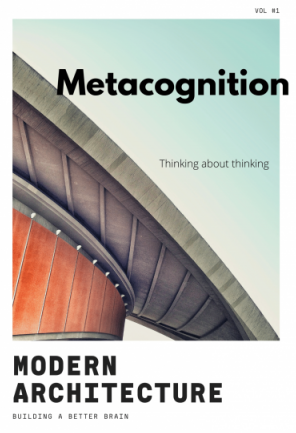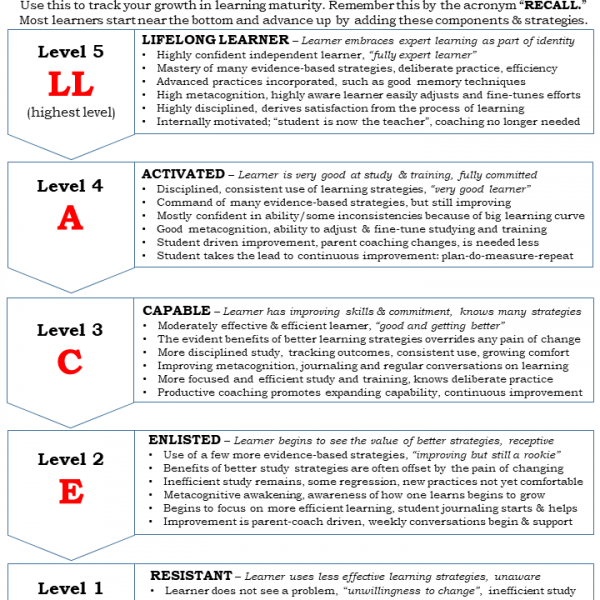
Why You Need to Teach Your Kids Metacognition

Reading time: 12 minutes
In this reading we will cover:
- Learning what metacognition is
- Understanding why it is important for your child to get better at it
- How to coach and begin constructive conversations to encourage it
Overview
Metacognition is important–if you want your child to become a rapid learner you must understand it and encourage it. Research studies show it is as important as IQ to learning outcomes. Better students practice metacognition, and expert learners have mastered it. But many or most students don’t know how to do it, and because parents don’t understand it, it isn’t encouraged. You can provide your child a significant learning advantage with it. The good news for you it is easy to coach, and it can be rapidly learned by students. But what exactly is this magical skill?
Metacognition is the knowledge and awareness a learner has about his or her cognitive processes, which means it is connected to the ability to learn and it is an attribute of higher learning maturity. A useful shorthand definition is “knowing about our knowing.” It can useful to think about it as the productive running conversations we have in our heads when we learn and problem-solve. The root word in Latin meta means “beyond” – so we can translate it into “beyond thinking.” This fits well because when you do it, you are pushing yourself into much deeper insights of your mental processes.
This article explains why this type of inner thinking is so important to developing better independent learners and what you can do to help your child get much better at it.
Definition
This is an excellent working definition should be simple because it makes it easier to discuss:
| Metacognition has simply been defined as “thinking about your own thinking.” |
This is a good start but thinking about your thinking has multiple components. It means monitoring, reflecting, and evaluating your learning as you practice it. It includes the processes you select when you try to learn something. And it also requires you to practice self-management and executive function.
The phrase was coined by developmental psychologist John Flavell in 1979, who is a founding scholar of the field. However, we can trace the roots of this idea back much further to Plato, who emphasized the importance of self-reflection and self-awareness.
Why is metacognition so important? Doesn’t everyone think about their thinking? Well no, at least not in productive and organized ways. In fact, it’s surprising how little this powerful concept has been introduced to students, and particularly so given the ancient Greeks were aware of it.
But we know today that metacognition is a critical component to being an expert learner. You can’t reach the highest level of learning maturity – lifelong learner without knowing how to do it. It is a best practice you should want for your kids.
The knowledge and awareness that your child has about his or her cognitive processes enables a higher ability to learn. So, it’s not a form of better thinking we are talking about, it’s a specific set of skills which can greatly improve learning.
For these reasons, we believe metacognition is something your child needs to understand and know how to use. The good news is that it can be taught, and it can be easily learned. Incorporate this into your homeschooling.
Two Elements
Flavell states that metacognition has two primary elements:
1) Knowledge – what you know about yourself as a cognitive processor and
2) Self-Regulation – managing and controlling how you go about learning or problem-solving.
In addition to thinking about your learning, metacognition involves self-regulation and self-reflection of your strengths, weaknesses, and the better strategies you should use in each learning situation. The metacognitive learner actively reviews and adjusts based upon her awareness of how effective the learning is progressing. It is not passive learning and something that is done every now and then.
Better learners know how to organize, monitor, and adapt to different learning situations. For example, the metacognitive learner becomes aware of distracting stimuli – both internal and external – and makes adjustments where less aware learners might not. This self-regulating component of metacognition is part of your child’s “executive function.”
Here is the benefit:
| Good metacognition allows the learner to maximize results, while poor metacognition leads to poor or less effective learning efforts. |
The better results you gain are why you need to help your child learn how to do it – and do it well. You need to add conversations on metacognition to your family values about learning and thinking.
What Does it Look Like?
Here are several examples of the internal thinking and actions of the metacognitive learner.
- When I learn, I notice I am having more trouble learning subject A than B and ask why.
- I know how to use my prior knowledge to plan a strategy for approaching a task.
- I am thinking about the content, but I am also noticing when my attention begins to wander.
- I am aware when my strategies are becoming repetitive and I make changes before I start just going through the motions.
- When learning, I frequently ask myself many WHAT questions — what are the most important concepts? What are the important facts? How well am I processing these? What do I understand? What do I not comprehend?
- When I finish a study or training session, I think about how to get better next time, and what I might have done differently.
The above examples illustrate how the active metacognitive learner is when training and learning. These are coachable behaviors and skills you can encourage both in your classroom and everyday conversations.
Metacognition has a critical role to play in successful learning, it should be practiced by both the student and the teacher.
College-Readiness
Because it is so powerful, it is not surprising that metacognition is an important component of college-readiness. Research studies show students who demonstrate a wide range of metacognitive skills perform better on exams and complete work more efficiently than those who do not.
Another study demonstrates how powerful it is.
Research by Swanson (1990) found that metacognitive knowledge can compensate for IQ and lack of prior knowledge when comparing fifth and sixth-grade students’ problem-solving.
Wow- this means metacognition has as much impact on performance as IQ! Students with high-metacognition were reported to have used fewer strategies, but solved problems more effectively than low-metacognition students, regardless of IQ or prior knowledge. While it is arguably difficult to improve IQ, in contrast it is easy to improve metacognition. This is why you need to coach and encourage it.
How to Coach It
Effective coaching benefits from a simple conceptual model to guide it. I’ve defined five key metacognitive skills that you can easily encourage your child to practice one at a time. (We should also strive to do these as adult learners.) These serve as steps with the prior supporting that later. It might be easier to take several learning task and break each down into these steps, so you have repetitive practices and conversations about each one at a time. Guide your child with good questions.
- Planning for strategies to learn task: For learning efforts large and small, emphasize a strategic approach to acquiring new knowledge and skills. This means weekly and daily planning for older learners. Ask questions like this, “Based on your understanding of how you learn best, how will you select the most appropriate learning strategies to learn this task? Emphasize: You don’t just start reading and studying — you plan to do it well.
- Creating steps to solve learning problems: Encourage insights that come from experience and trial and error. This can also come from a better understanding of the science of learning. Learning should be seen as a process, and not just a goal.
- Monitoring and Reflecting: Improve your child’s awareness of their comprehension and task performance. What activities resulted in more rapid learning? Which activities are not working so well? Why? A good way to gather this information is by tracking and evaluating efforts and outcomes through student journaling. To learn more about how to do this, click on this link: Student journaling.
- Evaluating Results: refers to appraising the outcomes of the efforts and the efficiency at which it was performed. This includes re-evaluating strategies and methods that were used. Self-testing and looking back at the student journal is an important source of information for these conversations.
- Modifying and Fine-Tuning your approach. An important purpose of good metacognition is getting better. It includes identifying less-effective methods and strategies and aggressively discarding them because they are occupying mental space that can be used better. To do this, you must know it and have proficiency with the many evidence-based learning strategies and methods, because this provides the access to an array of better choices.
Tips to Put It Into Action
How can you help your child learn to do this better? How should you coach your child to a higher awareness of his or her learning, and the use of the 5 skills above?
- Have frequent conversations with your child on “thinking about their thinking.” Make this a homeschooling educational theme where you always ask questions about the learning and thinking process. Use lots of questions on “what” are you thinking, “why” you did it that way, and “how” do you intend to study.
- You can teach it by modeling it – share your thoughts about your metacognition. For example, talk about how you discovered a mistake you made, reflected on your thinking at the time, and what you learned. Talk about how you monitor your learning, how you adjusted your thought processes, and why this contributed to a good outcome.
- Present the five skills listed above and use them as a learning template. Post them on the wall. Incorporate these into your conversations with your child about learning. Sit down and help your child make better decisions using these skills.
- With young children, start by helping them express what they are thinking about their learning. Do this in a non-judgmental way so that they learn sharing their thinking about thinking is a positive experience. Work on executive function (there are lots of internet resources on this. We have a good article in our parent resources.)
- We think one of the best ways to encourage middle school-age kids to do it is with weekly study planning and review meetings. These are an ideal place to initiate conversations on what strategies and resources your child intends to use. Here, you can teach them to set desired learning outcomes, and how to examine what has been working well, or not.
Fostering good metacognition is one of the most important things you can do as a learning coach. It should become part of your continuous improvement efforts on how to be a more powerful learner. Encourage your child to learn to use metacognitive strategies such as adapting, monitoring, self-regulation, and self-reflection. You can learn more about it in our online Pa 10 course Improving Learning Power by clicking here.
My Starting Point Before Talking About Metacognition
Before you begin your effort to improve metacognitive strategies, take a few minutes to ponder these questions. You will become a better coach when you have thought about these questions. Metacognition can be easily taught and learned over time, but students need to be self-motivated to use them. To help your child to succeed, you may need to coach self-evaluation skills and you may also need to discuss what a learning outcome should look like.
Here are some useful questions to ask to get started:
- How do I talk about this in a way my child can relate to it? In my own words, what is metacognition?
- Why is metacognition important for my child to know? How do I persuade him or her to want to learn to do it? Hint: What are the benefits of being a metacognitive learner? What’s in it for them?
- How effective is my child’s metacognition now? Where are we starting our improvement efforts at? How do I assess this? What questions can I ask to uncover what they do now? (This is important because it gives you a base to build upon)
- How can I help improve my child’s Planning skills? Where might we start practicing this?
- How can I improve my child’s Monitoring skills? With what subject?
- How can I improve my child’s Evaluating skills?
- When is the last time I practiced metacognition? (This will provide you with some examples to share). If you can’t think of anything, track yourself over the next few days with a journal and note some things you can share.
If you want to learn more about the power of metacognition, get our metacognition checklist in our parent resources section of the website.






